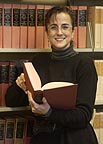January 17, 2007
Grant Association hires assistant editor

Leigh Fought
CARBONDALE, Ill. -- A leading research organization at Southern Illinois University Carbondale that specializes in the papers of Ulysses S. Grant has hired an assistant editor.
Leigh Fought joined the staff of the Ulysses S. Grant Association last month. She will play an important role in the association’s ongoing publication of annotated volumes of Grant’s papers and correspondence. The association is part of Library Affairs at SIUC.
Fought, who previously worked conserving and editing the papers of Margaret Sanger and Frederick Douglas, will help discover the context and meaning of the various Grant documents the association handles and publishes, said John Y. Simon, professor of history and director of the association.
“We’re very pleased that somebody with the background and talent that Leigh has would accept a position with us,” Simon said. “She has a lot of ambition and we are delighted to welcome her to SIUC.”
A native of Houston, Fought earned a doctorate in antebellum U.S. history in 2000 from the University of Houston, where she also earned a master of arts degree in colonial and revolutionary U.S. history and a bachelor’s degree in English. She also holds a master’s of library science degree, earned in 2005, from Simmons College. She is the author of several articles, book chapters and encyclopedia entries.
Grant, who at one time lived in northern Illinois, was known for his victorious command of the Union armies during the Civil War. After the war, he won election as the 18th president of the United States. He died in 1885.
Fought said a person’s papers — correspondence, memos, diaries, etc. — provide a window to their identity.
“You get to know them in great depth,” she said. “When you read a biography, you get to read about what the person who is writing it sees. But when you read the papers you see much more. With letters, for instance, we look not only at what the letter says but who wrote it, why and what was going on around them at the time.
“You get very personal with the subject. You’re combing through their lives. It’s the closest you can get to someone who is dead.”
Not only that, Fought said historic papers such as Grant’s reveal portions of our common history as a country.
“It’s not just about him but also gives clues as to what was going on in our country at the time,” Fought said. “In many of the letters we look at, the Civil War had only recently ended and Reconstruction was under way. What we see is in some places is that the country still was at war.”
The documents also show the day-to-day political duties associated with the presidency. Many are simply requests for political appointments or in some cases arguments against appointing a person to a job.
“Some of the letters are quite personal,” Fought said. “The Republican Party at this time was sort of redefining itself.”
Fought is enthusiastic about her new job.
“I enjoy making these documents accessible to other people,” she said. “Researchers are there to make these papers make sense.”
Volumes 29 and 30 of Grant papers currently are at the press and will be available shortly.